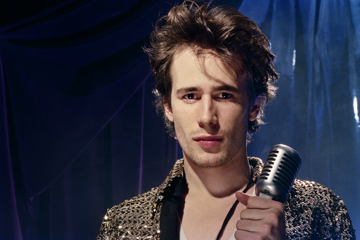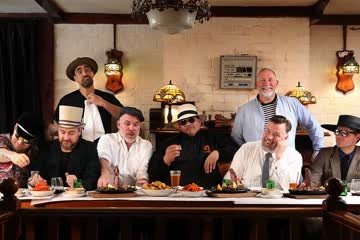Film Carew
"The crowd I saw it in was laughing at each traded sarcastic barb, but to me it was horrifying."
Richard Linklater's series of 'Before' films - 1995's Before Sunrise, 2004's Before Sunset, and, now, 2013's Before Midnight; a trilogy thus far lacking a catchy collective handle - are each genuinely great artworks unto themselves; 'walking-and-talking' movies that, in their easy conversations and unromanticised romance, say something profound on the human condition, on what it means to be alive, to draw close to another human, to exist in time. In the first, Ethan Hawke and Julie Delpy meet on a train and get off, spontaneously, to spend one night together in Vienna. They're young, far from home, and swept along with a tide of romance that seems magical, almost Godly. In the second, their paths cross nine years later, and each are now deep into adulthood, filled with second-thoughts about the decisions they've made in the years since; wondering if they're still free to hit the reset. In the newly-released third, they're now past 40, deep into a long-term relationship with each other, stressed out by work and juggling kids (a pair of seven-year-old twins named, significantly, Nina and Ella) and slowly sinking into passive-aggressive hostility; their romance having gone past realism into resentment.
As remarkable as each picture is in isolation, taken together they have become one of cinema's greatest ongoing dramas, a profound study in the passage-of-time by way of an artistic medium that plays with time like no other. François Truffaut's Antoine Doinel movies and Michael Apted's 7 Up documentary series have, for a long time, been the cinematic standard-bearers for capturing passing years, but each seems, now, kind of quaint in hindsight; seems to pale next to what Linklater has achieved with Before Midnight (he's also moving closer to finishing Boyhood, the 12-years(-and-counting)-in-the-making film he's been shooting with Ethan Hawke, Patricia Arquette, and growing-up-on-screen-as-they've-shot-it Ellar Salmon, which will only further these kind of discussions).
Before Midnight, once again, is a film built around the conversations of Hawke and Delpy; their parrying banter - be it playful or provocative, pacifying or poisonous - carrying theme and drama on its back. Where Before Sunset reduced it to purely this - following them, in near-real-time, with nary another character to be found - here Linklater widens the scope. The couple are on holidays in Greece, away from home again, and thus open to the kind of distance perspective and removed-from-the-daily-routine opportunities to think of life in the big picture, as a grand narrative. They're staying at a house owned by an aging British writer (cinematographer Walter Lassally), and populated by various Greeks (including Greek weird-wave director Athina Rachel Tsangari, whose first cinematic experience was appearing in Linklater's Slacker two decades prior; and her collaborateur Ariane Labed, of Attenberg and Alps). These characters exist as sounding-boards for Hawke and Delpy to discuss masculinity, gender, romance, relationships, careers, literature, love, the idea of soulmates, etc.etc.
Together, as writers, Linklater, Delpy, and Hawke have a way of taking existential or philosophical notions and turning them into condensed sentiments that read like poetry, but play like natural conversation. “We are so important to some, but we are just passing through,” a character muses, on the ephemeral nature of time and the limits of temporality. When Hawke and Delpy are discussing their shared parenthood, one offers “we all get dragged through our parents' lives.” This is a rejoinder to things they discussed in Before Sunrise, all those years ago, and it's clearly intentional; when Delpy asks “what is it you don't like about me?” again, 20 years on, she's repeating something she wondered first time on. It's a profound moment that suggests people both change radically and not at all, but makes clear how much this third film is a mirroring image of the first; its perspectives of life and love and time seen, this time, in reverse.
Don't miss a beat with our FREE daily newsletter
In Before Sunrise, as young people, wandering free, the two characters spent so much of their conversational energy projecting forward: imagining who or what they'd be in five, ten, 20 years time. They look forward to so much, but also fear growing old; losing their individualism, their rebellion, their fire, their passion. Before Midnight takes place in that space; the couple now navigating a relationship where ardour has cooled and romance has largely vanished. Now, they have more to look back on than to look forward to; their conversations - especially when they wander lonely through Greek ruins - forever turning back to shared memories, shared experiences, to the people they had once been before the scourge of time - that thing they so lack as full-time professionals and parents - took away their youth.
The couple are set free from their parental responsibilities for a night, gifted a 'romantic' overnight stay at a nearby hotel, with the kids taken care over. Suitably, when presented with a packaged version of romance, they rebel against it; and, soon, we're not in the pleasing, sunkissed midst of two charming characters walking-and-talking in a picturesque locale, but holed up in a hotel room, locked in some Bergmanesque hell, as Delpy and Hawke, romantic poster-children for a generation of cinephilic romantics, turn on each other with toxicity, with fury. This series of films has so struck a chord due to how universal it's felt, and anyone who's ever been in a relationship-turning-sour will be able to identify with this unbroken, unedited-away-from fight; the way it comes and goes like the tide, the way it turns swiftly spiteful; years' worth of resentment unleashed the moment that the gloves are off.
The crowd I saw it in was laughing at each traded sarcastic barb, but to me it was horrifying; a film series that once inhabited that sacred space outside of the mundane throwing itself into the brutal realities of life as parents, right into that relationship at its worst, when repressed resentments are being turned into weapons, leaving wounds that will never heal. There's a moment herein where Hawke opines that seeing their girls grow up so fast is sad; Delpy counters that it's not, that them growing up is natural, and that the passage-of-time is a kind of Rorschach test. If Hawke sees it as sad, that's because he's sad. So what does it say about your old pal Film Carew, that I found this film - and, now, this film series - impossibly, heartachingly sad?

The new Brat Pack?
This Is The End arrived with all the hallmarks of Hollywood stars abusing their privilege: those upwardly-mobile dudes of the Apatovian bromantic-comedy industry - Seth Rogen, Jay Baruchel, Jonah Hill, James Franco, Danny McBride, Craig Robinson - getting together for an end-of-the-world dickaround so uninspired its great gag was that they're playing themselves. There's usually nothing worse that 'insider' Hollywood comedies, which almost always recycling the most dreadful clichés of ego-amok stars and bimbo starlets and artless producers and bloodsucking agents; and seeing the endless list of famous people playing themselves in This Is The End caused my heart to sink. But Rogen's directorial debut (co-helmed with longtime collaborateur Evan Goldberg) fulfils its modest goals - a biblical apocalypse as a forum for friends to vindictively take out their frustrations on each other, replete with dick jokes - fine, and watching the human performance-art project that is James Franco navigate a film in which he's playing himself - as opposed to life, where he also plays himself - is fun. There's also an awesome Franco vs McBride improv involving a discussion re: ejaculation; and the film's genuine sense-of-humour - and how happy it is to mock itself - saves it from the realm of insufferable indulgence.







